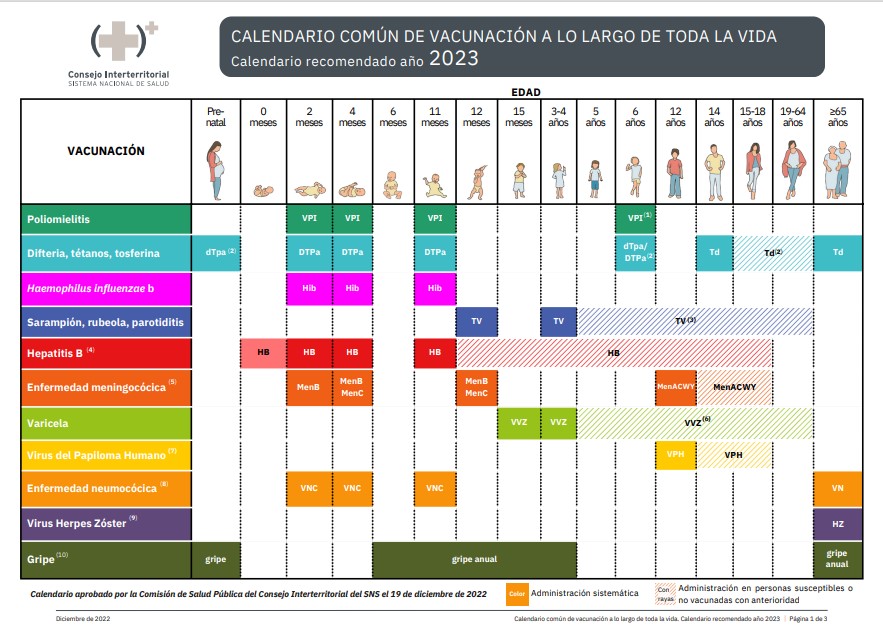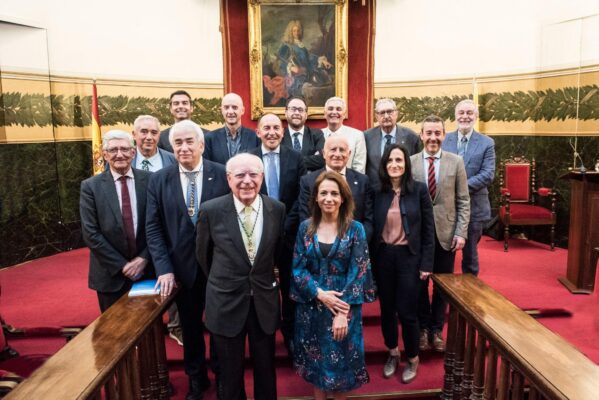Take a seat in the waiting room of a healthcare centre in Spain and you are likely to see a poster for the country’s revised ‘routine immunisation schedule across the life-span’, known informally as the calendar for life. As the name suggests, Spain’s approach aims to extend protection against preventable diseases to all age groups of the population.
Snap summary:
- Trust in healthcare professionals, and uptake of recommended vaccines, is high in Spain
- The routine immunisation schedule, set at national level and administered by regions/autonomous cities, takes a life-course approach
- As part of its EU Presidency which began on 1 July, Spain will host a meeting on ‘strengthening immunisation across the life-span after COVID-19 vaccination’
- President of Spanish Vaccinology Association calls for greater transparency on decision-making, and translation of recommendations into policy
- A new National Immunisation Registry, SIVAMIN, could be operational from 2025
The updated schedule now includes meningococcal B vaccine at 2, 4 and 12 months; HPV vaccination for boys as well as girls; flu vaccination for children (aged 6 months to 5 years); and herpes zoster (shingles) vaccine for people at 65 years of age.
‘Immunisation across the life-course is necessary due to the high burden of the targeted diseases, such as influenza and pneumococcal among others,’ explains Carmen Olmedo at the Ministry of Health Vaccination Programme. ‘Having a life-span schedule is essential to ensure an immunised population at all age groups, notably the elderly population which is more vulnerable.’
From infants to adolescents, and from pregnant women to older people, Spain is prioritising prevention. But has the message got through yet? ‘So far, coverage is lower in the adult and elderly population, therefore an area to improve is to raise awareness of healthcare professionals,’ says Ms Olmedo.

Experts point to progress in this area. ‘We are not there yet, but we are seeing progress, step by step,’ says Dr Jaime Pérez, President of the Spanish Vaccinology Association. ‘Training for nurses and others is taking place, posters are in every clinic, communication material has been developed.’
While Spain’s paediatric immunisation schedule is very well established, with high levels of trust in paediatricians and paediatric nurses, a cultural shift is under way to extend this to the whole population.
Mirroring the ‘healthy children’ consultations offered for free by paediatricians, Dr Pérez hopes to see similar check-ups for older people which would provide an opportunity to administer routine vaccines such as influenza and pneumococcal disease. ‘People in Spain trust their doctor and their nurse; the more we reach healthcare professionals, the better our chance of reaching the wider public.’
Pedro Carrascal, Director of the Spanish Platform of Patient Organisations, says people living with chronic diseases are increasingly aware of the role of vaccination in staying healthy, but more action is needed to connect patients with information and services.
‘One of the lessons of the COVID-19 pandemic was that vaccines are important for patients with chronic conditions,’ he says. ‘We now need tailored, stratified information for patients to reinforce this message for other vaccines, such as flu vaccines, and let people know where to get vaccinated.’
Transparent decision-making & access to vaccines
Viewed from the outside, Spain’s immunisation system can appear complex. However, uptake of childhood vaccines is generally excellent, and flu vaccination rates are higher than many European countries ‒ even if they fall just short of the target to vaccinate 75% of older people. Free access to vaccines approved by European regulators can be slower than elsewhere in the EU. For example, Spain is relatively slower to reimburse new vaccines compared to Germany where the process is accelerated.
As a highly decentralised country, Spain’s regions and autonomous cities have ultimate responsibility for setting vaccination schedules and delivering immunisation programmes. This can give rise to some differences in access to vaccines from one region to the next. For example, some regions have school-based adolescent vaccines, but most do not.

In practice, however, a National Immunisation Technical Advisory Group (NITAG) plays an important role in key decisions. This group includes experts and officials from across Spain who are responsible for regional vaccination programmes. Its recommendations go to a Public Health Commission which sets national policy on adding new vaccines to the list of free immunisations. Then it’s up to the regions to make it happen.
‘Decision-making and implementation takes time,’ Dr Pérez says. ‘It can take years from the recommendation of the NITAG to a new vaccine being covered by the system. This should happen more quickly, although since the COVID-19 pandemic, progress on this has accelerated.’
For example, after the Spanish NITAG recommended the introduction of flu vaccines for children, it took several months for the Commission to approve it. Dr Pérez called for greater transparency on the work of the NITAG, including its recommendations to the Commission, and on the work schedule of the Commission.
Vaccine development and data
In April, to mark European Immunisation Week, promoted by the Spanish Vaccinology Association (AEV) together with the Farmaindustria Vaccines Work Group, Dr Pérez chaired an event in Madrid at the Spanish National Academy of Medicine which examined the future of immunisation in Spain. Among the issues discussed was Spain’s potential to develop new vaccines and to collect its own vaccine effectiveness data.
‘We have the knowledge, but we don’t have the capacity to join the different actors to really develop a vaccine from the lab to the person’s arm,’ he explains. The Ministry notes that public-private collaborations are in place that can help to advance work in this area, although these operate at regional level.

When it comes to data collection, Spain has produced effectiveness data on COVID-19 vaccines, mpox vaccination and for the meningitis B vaccine. ‘What we lack is the human resources to be able to do this in a systematic way that would allow us to evaluate our programmes based on only on vaccine uptake, but on the reduction in diseases,’ Dr Pérez says. Spain is currently working on a national immunisation registry, known as SIVAMIN. From 2025, national data will be available in close to ‘real time’.
Spain keeps ‘life span’ vaccination on the EU agenda
Now, as Spain takes over the six-month EU Presidency, it aims to keep vaccination on the agenda. In December 2022, Health Ministers from across the EU, led by the Czech Presidency, agreed to enhance vaccination for people of all ages.
In the coming months, Spain will host an in-person meeting entitled ‘Strengthening immunisation across the life-span after COVID-19 vaccination’ to help sustain momentum on this important topic.

This reflects a wider effort in Spain itself to build the vaccination ecosystem and take a life-course approach with the active engagement of all stakeholders. A roundtable event was held in Madrid on 24 April to explore the achievements and opportunities of vaccination in Spain. Speakers were drawn from policymaking, academia, healthcare professionals, patients and industry.
Spain’s experience will hold lessons for some of its European peers, while there will undoubtedly be opportunities to take inspiration from other countries that have introduced a life-course approach to vaccination.
‘Pandemic shows importance of vaccines for chronic disease patients’
The Spanish Platform of Patient Organisations represents a wide range of people living with conditions such as diabetes, heart disease, lung conditions, among others. During the pandemic, these patients were among the priority groups for COVID-19 vaccination due to the elevated risks patients faced if infected with the virus.
While there were communication challenges in the early phase of the COVID-19 vaccination programme, the message that vaccines are particularly important for this group is one of the legacies of the pandemic. Pedro Carrascal, Director of the Spanish Platform of Patient Organisations, sees opportunities to learn lessons and apply them to other vaccine-preventable diseases.
‘The pandemic has brought conversations about vaccines to the streets, showing the reality of their importance for people with chronic conditions,’ he says. ‘This was not previously appreciated, but there is now an awareness of the need to protect patients against preventable infections.’

Stratified communication campaigns, with clear information tailored to various patient groups, can build on the vaccine awareness generated in recent years. ‘Patients sometimes lack information from the health system on whether they should be vaccinated and who will administer vaccines to them,’ Mr Carrascal says. ‘In some cases, there is not enough information on specific vaccines and whether they are suitable for certain patients. GPs need to be ready to answer patients’ specific questions about vaccines, while specialists are often more focused on disease management than prevention of infectious illness.’
While the pandemic has put vaccines on the agenda for many patients, there is still work to do if this is to remain a priority for patients: ‘There is no doubting the importance of vaccines for people with chronic illnesses, but we need to talk more about vaccines as patients and health professionals need to be more familiar with them. The situation has improved since the pandemic, but there is still a long way to go.’





Pingback
August 29th, 2023
[…] Spanien will mehr erreichen: Den aktuellen Vorsitz im Rat der Europäischen Union (EU) möchte die Regierung nutzen, um die Bedeutung von Impfungen in den Fokus zu rücken. Erst kürzlich richtete das Land ein „High Level Meeting“ in Madrid dazu aus. Spanien hat erkannt, wie wichtig es ist, das Impfen in allen Altersgruppen im Blick zu behalten. Umgangssprachlich als „Kalender fürs Leben“ bekannt gibt der „Calendario de vacunación a lo largo de toda la vida“ den Spanier:innen einen Überblick über alle empfohlenen Impfungen entlang der verschiedenen Lebensphasen – angefangen vor der Geburt während der Schwangerschaft, über die Baby-Zeit und Kindheit, bis hin zum Erwachsen- und Seniorenalter. „Wir sind noch nicht am Ziel, aber wir sehen Fortschritte“, so Mediziner Dr. Jaime Pérez, Präsident der „Asociación Española de Vacunología“ (AEV). „Es finden Schulungen für Pflegekräfte und andere Personen statt, in allen Kliniken hängen Poster, es wurden Kommunikationsmaterialen entwickelt“ (s. vaccinestoday.eu). […]